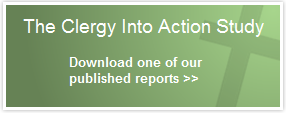Like clergy before them, recently ordained pastors and priests see themselves across the entire range of introversion-to-extraversion. There appear to be three major groupings: clergy who see themselves as strongly introverted (like pure “I’s” on the Myers-Briggs), clergy who see themselves as strongly extraverted (like pure “E’s” on the Myers-Briggs), and clergy who see themselves as evenly balanced.
The smallest grouping is the strongly introverted clergy—and the largest grouping is the strongly extraverted clergy. The introverted group of clergy shows a preference for being more reserved, cautious, serious, and consistent. The extraverted group of clergy shows a preference for being expressive, impulsive, stimulable, and variable.
People in sales and service tend to be more extraverted. And people in a variety of professional fields (such as health and education) tend to exercise more extraversion when they are in more senior roles of management and leadership.
Clergy are most similar to other professional managers and executives. As might be expected, more seasoned Episcopal priests in positions of solo or senior leadership in churches, as a group, were somewhat more extraverted than newer clergy. More seasoned clergy are closer to workers and managers in sales.
As shown previously, newer clergy (like longer-term Episcopal priests) run the range of introversion-to-extraversion. The fundamental challenge is not whether one is introverted or extraverted as a pastoral leader; rather, the challenge is whether or not one is aware of and able to manage the strengths and hindrances of being mostly introverted or mostly extraverted.
In the end, both introverted and extraverted people can exercise exceptional leadership—and can bring their own pitfalls to leadership. The same is true in ordained ministry. Extraverts pave the way easily for relationships to develop, both with themselves and between other people, and their charisma can be energizing—but their preference for variability can make them seem unpredictable to others. Introverts put more emphasis on more limited focus, including the development of deeper (but fewer) enduring relationships. Each of these dispositions have their place in ministry, but they can both also hinder effectiveness.
So, it may not matter whether you are introverted or extraverted. What does matter is how you use that disposition.
For Your Consideration
- Where are you along the range of introversion-to-extraversion? How does it help your ministry and leadership? How does it limit or hinder you?
- How can clergy help each other strengthen their awareness of how to use their dispositions in more refined ways—and get out of their own way when these dispositions become a hindrance?
Related Articles




